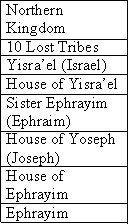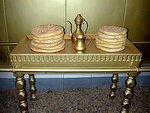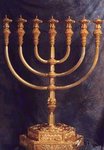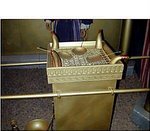In Genesis 13:14-16 Yahweh our Heavenly Father promised Abram the land of Canaan as well as a promise of physical multiplicity of his zera, or his seed (sperm). Abram was told that this promise of physical multiplicity will be so vast and so extensive that the entire earth will literally be full of his zera. Verse 16 tells us that by the time this promise is literally and physically brought to pass it will be absolutely impossible for mankind to even count it or take a census of it; since mankind is totally unable to count the dust of the earth. That same seed will inherit the land eventually to be known as Israel.
Abram tries to help Yahweh by choosing Eliezer, who is not a physical offspring of Abram's own sperm or zera, to be the one through whom that promise would be brought to pass. Yahweh rebukes him and makes clear to him that this promised heir would come from Abram's own body. Any tendency to somehow spiritualize this promise is a lack of faith in Yahweh's literal Word.
This promise of physical multiplicity and blessing is renewed in Genesis 17:4 where Abram is told that this promise will establish him as a father of many nations or "hamon goyim". This term "hamon goyim" is also found in verse 5 and literally means a noisy multitude of Gentile nations. Verse 6 promises Abraham that through this seed of promise, kings would be manifest. This of course is talking about the kings that would one day make up the royal House of David through whom Messiah would come to His throne. In verse 7 Yahweh reassures Abraham that this promise of greatness through physical multiplicity would be unconditional and everlasting.
We know that Abraham and Sarah have a son, the fulfillment of the promise, named Isaac or Yitsaq. Yahweh made it clear that Ishmael was not the fulfillment of the promise. In Genesis 26:4 we see this promise of physical increase being renewed with Abraham's son Isaac. He is told that his seed will be more than the stars of heaven. The promise of physical multiplicity that would fill the earth, yet still possess the land of Canaan as its own homeland.
Isaac, (Yitsaq) has 2 sons, Jacob (Ya’acob) and Esau (Esaw). Genesis 28:3 finds Isaac blessing Jacob and prophesying that the promise that Yahweh gave Abraham and Isaac would now be bestowed upon Jacob and not Esau. We see that in verse 3 Isaac prays that Jacob's seed would be blessed and become a "kehelat goyim" or "assembly of peoples." For the first time in scripture we get a glimpse of Yahweh's plan for filling the earth with the seed of Abraham, Isaac and Jacob. Somehow the Father will fill the earth with the physical seed of Abraham, Isaac and Jacob by putting together an assembly of peoples. In Genesis 28 in the account of Jacob's ladder we find Yahweh telling Jacob that his seed will be spread out as the dust of the earth and will break forth to the four corners of the globe. In other words his offspring would find its home in the land of Canaan, but would somehow through Yahweh's divine plan break forth and find its way to the four corners of the earth. This promise is the same promise and blessing of Abraham. The Hebrew term used in Genesis 28:14 is the term "parats" meaning to break forth. It literally means to jump out and spread quickly.
In Gen. 48:14-20 We find Israel (Jacob renamed) gives a blessing to each of his children. But he also adopts Joseph’s 2 sons and gives them a blessing as well. When he does, he gives the first born blessing to Ephrayim instead of Menashsheh who was the physical first born.
Gen. 48:14-20 "And let them increase to a multitude in the midst of the earth." And when Yoseph saw that his father laid his right hand on the head of Ephrayim, it was evil in his eyes; and he took hold of his father’s hand to remove it from the head of Ephrayim to the head of Menashsheh. And Yoseph said to his father, "Not so, my father, for this one is the first-born, put your right hand on his head." But his father refused and said, "I know, my son, I know. He also becomes a people, and he also is great. And yet, his younger brother is greater than he, and his seed is to become the completeness of the nations." And he blessed them on that day, saying, "In you Yisra’el shall bless, saying, Elohim make you as Ephrayim and as Menashsheh" Thus he put Ephrayim before Menashsheh."
After stating "let my name be called upon them," meaning they are Israel's children, he prays that they will become a multitude. The Hebrew term used here for multitude can be read as a "teeming multitude of fish".

Israel declares that the seed or zera of Ephraim will become the "melo ha goyim", or the "fullness of the Gentiles". In other words the physical seed of Abraham, Isaac and Jacob that was promised to one day literally fill the earth as the sand and dust of the earth and stars of heaven, will now come to pass in and through Ephraim. Ephraim will be the vehicle though which the great and precious single promise of physical multiplicity will literally come to pass. If the term “fullness of the Gentiles” sounds familiar it should. It is a quotation from Romans 11:25 by Shaul (Paul) as the method and means by which all Israel would be saved.
There is however some needed insight at this point. In all ancient Mideast cultures the right of the firstborn was essential in establishing leadership over the house of the dying father. With the birthright went power, authority, respect, grandeur and the right to enact all family business and transactions pertaining to its sustenance, care and well being. In essence the birthright was the permission to the firstborn to take over and rule the fathers' house in the father’s absence through death. Isaac received this right from Abraham even as Jacob received it from Isaac. With the birthright went power and therefore it was coveted greatly in that culture.
When Israel gave Ephraim the birthright, however, he gave it to him with one major reservation. We read about this in Genesis 49:8-10, where Judah is given the pre-eminence or power to rule and reign royally over the House of Israel! Verse 9 states that all Israel's children will bow before the royalty of Judah and verse 9 states that the pre-eminence will cause all Israel to pay homage to the Lion of Judah whom verse 10 refers to by the Messianic name of Shiloh. Shiloh means the "sent one" or the anointed King Messiah from the kingly line of Judah who would be manifest in the natural through the tribe of Judah. Hebrews 7:14 makes it clear that Yahshua was Shiloh and it is evident that He sprang forth from Judah.
Did Jacob go to all the trouble of establishing Ephraim as the firstborn with the firstborn birthright only to give him a title without authority and without preeminence over his brothers? He did bring a split into and among the sons of Israel since one son had a birthright but the other son Judah had the right to rule. What good is a birthright without the authority that goes along with it? The children of Israel would submit to Judah's seed not Ephraim's, yet Ephraim's seed would become the fullness of the Gentiles. Judah would rule over the House of Israel, but Ephraim would bring forth the promised zera (seed) that would fill the globe with the promise to the patriarchs of physical multiplicity. Of course Israel knew what he was doing since he was ministering through the Ruach HaKodesh (Holy Spirit). He split the authority and blessing between the two brothers who would continue to wage war over the fullness of the blessing that would ultimately be played out in a battle royal over the title of “Who is Israel?” How ironic that according to Genesis 49:10 it will be the Lion of Judah (Messiah Yahshua), that would regather the goyim or nations of the seed of Ephraim back into the House of Israel.
After Israel died and his children became great in Egypt this promise of physical multiplicity began to trouble a Pharaoh who “knew not” Joseph. Of course he enslaved the Hebrews and it took Moshe (Moses) the great deliverer to rescue Israel from the house of bondage. As history teaches us, Moshe took the twelve tribes out of Egypt, to Sinai where they received Torah and then the twelve tribes settled the land of Canaan. After a period of diverse Judges and after King Saul, David was anointed King over all Israel. In the days of David the King, we see the house of Judah ruling and reigning over a united Israel with 12 tribes under David's monarchy. All was well until Solomon, David's' son, began whoring physically as well as spiritually and Yahweh revealed to Solomon that the kingdom would be broken in the life of his son Rehoboam because of Solomon's sins. (1 Kings 11:11-14). Yahweh further revealed to Jeroboam, an Ephraimite, one of Solomon's talented craftsman, that he would receive ten tribes resulting from this split in the kingdom of Israel after Solomon's death. The days under David was the last time that the kingdom belonged to all Israel, made up of all twelve tribes. In approximately 921 BC the ten northern tribes broke away from the House of David and called themselves Israel making Samaria its capital. The southern tribes of Judah, Benjamin and Levi made up the southern kingdom under Rehoboam with Jerusalem as its capital (1 Kings 11:26-43). This split in 921 BC was simply the literal fulfillment of the prophecy pronounced by Jacob over his sons when he split the family so to speak. He split the birthright between Ephraim and Judah and that is why Yahweh says in 1 Kings 12:24 that this family split is from Him. He ordained it and desired it so that He could bring to pass the promise He made to the patriarchs; specifically the promise of physical multiplicity. The means by which our Heavenly Father chose to do this is through this split in David's House.
The Kingdom of Israel is known throughout Scripture by several names: Israel, Ephrayim, Joseph. The Northern kingdom of ten tribes began to adopt pagan practices, holidays, customs and false worship. Unfortunately, Jeroboam became the father of Ephraimite pagans. In 1 Kings 12:26-33 we see the evil heart of Jeroboam son of Nebat as he devised a scheme for the ten tribes collectively known as the House of Israel or Ephraim to begin to practice a false religion designed to keep Ephraim separate from Judah and separate from Judah's Elohim. This system of Jeroboam had as its basic design the creation of a separate entity from the House of David consisting of the ten tribes in the north.
This separation unto debauchery and unto Ephraim's departure from the family of Israel resulted in Yahweh's judgment. Between 734 and 722 BCE Yahweh sent Tilgat Pilsger III, the Assyrian king, to utterly destroy the House Of Ephraim or the ten northern tribes. Since Ephraim played the harlot and lifted her skirt to every foreign deity, Yahweh declared that He would in like manner sift her and cause her to be naked before the Gentile nations, by bringing an end to the northern kingdom, of Israel. This stern punishment would be enacted by the dispersing and swallowing up of these ten tribes by the world's pagan nations. Since Ephraim's lust, penchant and desire for paganism was so great, Yahweh permitted the ten tribes to become the very thing that they so desperately and so wickedly craved to be. Thus we find that the children of Israel experienced their first holocaust in 722 BCE when ten tribes seemingly disappeared and became lost spiritually as well as physically. Thus was born the “Ten Lost Tribes of Israel”.
This breakup was the method by which Yahweh chose to fulfill the promise of physical multiplicity to the patriarchs. Are the ten tribes really lost? Can they be found? Have they been destroyed, or somehow preserved? Did the Messiah come to restore the Tabernacle of David which had fallen in 920 BCE? Did the “Ten Lost Tribes of Israel” become Gentiles later to be regathered back into the House of Israel by the ministry of Messiah? Is it possible that the ten tribes became the "melo ha goyim" or the "fullness of the Gentiles" that we read about in Romans and that was promised to be the physical Israelite seed through Abraham, Isaac, Jacob and Ephraim?
We will continue with our study of the Hebrews in the next edition. Hopefully we can answer many of these questions. However, if you can’t wait, most of this article was taken from a teaching by Ben Ehrhardt, our congregational teacher, from our congregation’s website, HearOIsrael.org. You can find more of this teaching with more detail under the “Two House 101” Teaching on the site.
Blessings and Shalom!














